For the longest time, B2B demand gen felt like a numbers game. It was all about shoving as many prospects as possible into the top of a funnel and hoping some would trickle out the bottom.
But let’s be honest. That old-school approach is broken. Today’s buyers are tired of aggressive sales tactics. They tune out the noise and tune into genuine expertise.
Shifting From Lead Capture to Audience Creation
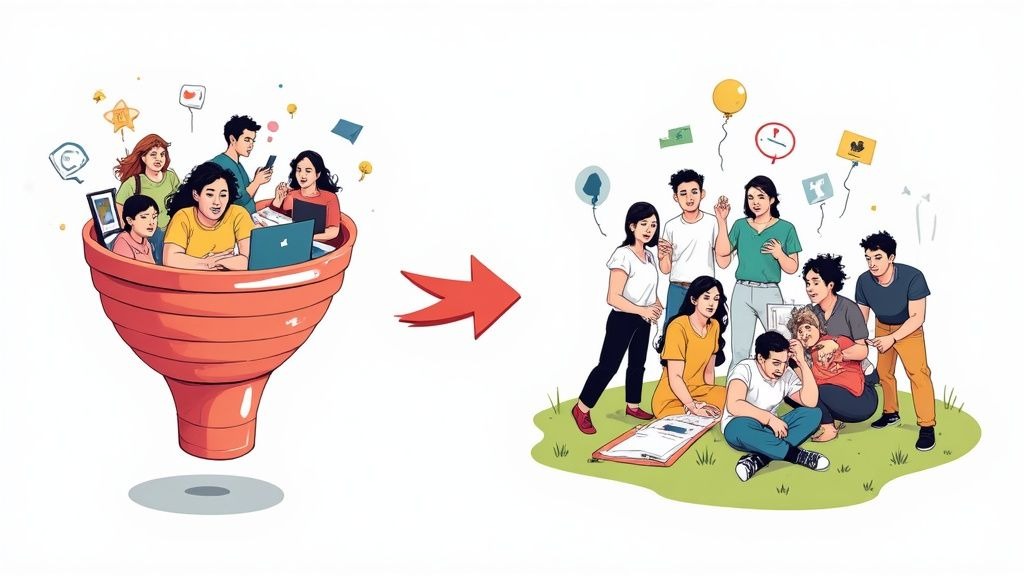
The new playbook isn't about capturing demand; it's about creating it. Forget chasing leads with gated content and cold emails. Modern marketers are focused on building a loyal audience, a group of people who trust their brand and come to them when they finally have a problem to solve.
This isn’t just a small tweak; it’s a complete flip of the script. The goal is no longer to snag an email address at all costs. The goal is to become an indispensable resource in your industry. It's a long game, for sure, but one that builds real, lasting relationships.
The trick to demand generation is not to expect anything back from your prospects. Only the knowledge that you’re creating a good feeling between them and your brand.
It’s a simple swap: stop interrupting people and start attracting them. By consistently putting out valuable, educational content, you earn the attention and respect of your ideal customers.
Building Trust as a Core Metric
In this new world, trust is everything. It's the ultimate currency. People are far more likely to listen to, and eventually buy from, a company they see as a credible, helpful authority. This is where marketing thought leadership becomes so critical.
So, how do we measure success? It's not just about MQLs anymore. We're looking at:
- Audience Growth: Is the group of people who regularly consume your content getting bigger?
- Engagement: Are people actively talking about, sharing, and discussing your ideas?
- Brand Affinity: Do prospects automatically think of your company as the go-to expert?
Setting the Stage for the Ultimate Trust Engine
Now, you can build this trust across a bunch of different channels. Social media and email newsletters are fantastic for getting your content out there and guiding people along.
But there's one format that stands out as the holy grail of B2B marketing for its ability to build deep, personal connections at scale. It’s the place where authentic conversations happen, where your team's expertise truly shines, and where you can build a community of fans who will become customers when the time is right.
That’s what the rest of this guide is about: showing you how a B2B podcast acts as the ultimate engine for this trust-based approach to demand generation.
Why Podcasting Is the Holy Grail of B2B Demand Gen
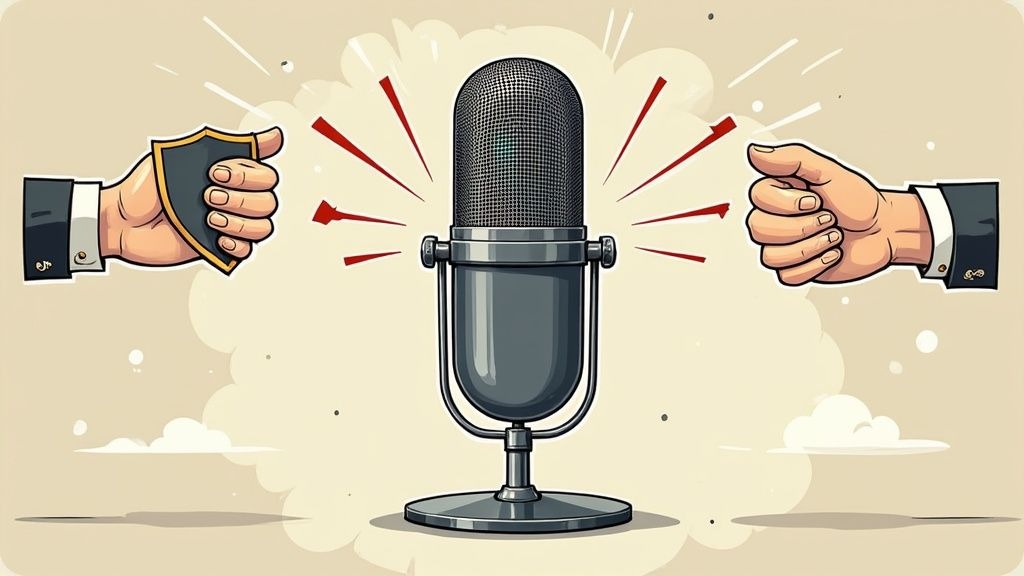
In a B2B world overflowing with noise, trust isn't just a nice-to-have. It’s your single most valuable asset. While all sorts of content can grab eyeballs, one medium stands out for its uncanny ability to forge deep, human connections at scale.
We're talking about the B2B podcast. It's the holy grail for modern demand generation.
Think about it. A fleeting social post or a buttoned-up whitepaper can only do so much. A podcast, on the other hand, is incredibly intimate. It lets your ideal customers hear the actual voices, personalities, and unscripted thoughts of the people behind your brand. That creates an authentic bond that plain text just can't touch.
By showing up consistently in their ears with valuable content, you stop being just another vendor. You become a trusted advisor. This is how you build a real b2b demand gen engine fueled by loyalty, making you the first person they think of when it's time to buy.
From Content Consumer to Brand Advocate
Content marketing is still the bedrock of any solid strategy. No surprise there. In fact, 85% of B2B marketers point to content as their primary tool for lead generation, aiming to build brand awareness and trust.
But not all content is created equal when it comes to building relationships.
Sure, blog posts and newsletters are great for informing your audience. But podcasts captivate them. They give you the space to go deep on complex topics, share genuine stories, and bring on expert guests who lend their own credibility to your brand.
"Creating content that builds deep trust with your ideal buyers is the most effective marketing you can do." - Tom Hunt, Founder of Fame.
Someone who tunes into your show week after week isn't just a prospect anymore. They're becoming part of your community. They're investing their time to learn from you, forging a powerful connection that short-form content rarely achieves.
Why Audio Builds Trust Faster
So, what is it about audio that makes it such a trust-building powerhouse? It really comes down to its raw, personal nature. In a b2b demand gen context, the advantages are huge:
- Authentic Voice and Tone: People hear the conviction and enthusiasm in your voice. That builds credibility in a way that written words just can't.
- Passive Consumption: This is a big one. Prospects can listen while they're driving, at the gym, or even doing other work. Your brand becomes a consistent, helpful presence in their daily routine without demanding their full attention.
- Deep Dives and Nuance: Podcasts give you the runway to properly explore complex ideas, showing off the true depth of your company's knowledge. You get to move way beyond surface-level marketing speak.
This consistent, in-depth exposure is what flips the switch, turning a passive listener into an active fan of your brand. They feel like they actually know the people behind the mic, which is a massive differentiator when they finally need to make a purchase. You can learn more about what makes a podcast good and how to put these principles to work.
The Podcast as the Central Hub
The best way to think about your podcast is as the sun in your content marketing solar system. Everything else, social media, email, your blog, should orbit around it.
For instance, you can take a killer snippet from your latest episode and turn it into a compelling video clip for LinkedIn. Then, you can use your email newsletter to promote the full episode to your most engaged subscribers.
These other channels are the on-ramps that feed people down the funnel. They guide people from bite-sized pieces of content toward the main event: your podcast. That's where the real loyalty is formed, creating a pipeline of future customers who are already sold on your expertise before they ever talk to sales. This is the future of smart b2b demand gen.
Laying the Groundwork for Your B2B Podcast
A game-changing podcast is built on a solid blueprint, not just a fancy microphone. If you want a show that actually moves the needle for your b2b demand gen strategy, you have to start with a clear, intentional plan. This is your guide to getting that essential groundwork right from day one.
The journey doesn't start with equipment; it starts with your audience. Before you even think about hitting record, the most critical step is to get inside the heads of your listeners. Content that connects is always built on a deep understanding of who you're talking to. To make sure your podcast is hitting the mark, it's worth exploring how to create buyer personas that drive growth.
This persona will be your North Star for every decision, from the show's core concept to its tone of voice. Is your ideal listener a busy CTO who needs quick, actionable insights? Or is it a marketing manager hungry for deep-dive strategic discussions? Answering that question is the secret to creating a show they can't afford to miss.
Nailing Your Unique Show Concept
Once you know exactly who you're talking to, you can figure out your podcast's unique angle. The B2B podcasting world is getting crowded, so a generic show about "marketing trends" just won't cut it anymore. Your concept needs a sharp, specific focus that lines up perfectly with your audience's problems and your company's expertise.
Ask yourself these questions to carve out your niche:
- What specific problem will our show solve for listeners? Don't try to be everything to everyone. Zero in on a single, distinct pain point.
- What unique perspective can we bring to the table? Tap into your team's specialized knowledge or unique access to industry players.
- What format best delivers our message? Will you be doing expert interviews, solo deep dives, or roundtable panel discussions?
After you've landed on a compelling concept, it's time to map out your content. A simple content calendar for your first 8-12 episodes gives you structure and ensures you launch with some real momentum. This initial batch proves you're serious and gives new listeners a backlog to binge.
Demystifying Your Podcast Setup
So many would-be podcasters get stuck on the equipment, but getting studio-quality sound is more achievable today than ever before. You don't need a Hollywood-sized budget to sound professional. The real goal is just to create a clean, crisp audio experience that makes listening easy and enjoyable.
A basic, high-quality setup is all you really need to get started.
A great podcast is built on valuable content, not expensive gear. Focus on delivering incredible insights with clear audio, and your audience will reward you. Your message is far more important than your microphone's price tag.
For a detailed breakdown of what you actually need, a good B2B podcast equipment guide can cut through the noise. The essentials usually come down to a quality USB microphone, a decent pair of headphones to monitor your audio, and some recording software. For more in-depth guidance, check out articles on the best podcasting setup and exactly what equipment is needed to podcast.
Creating a Simple Podcast Business Plan
Finally, treat your podcast like any other strategic project in your business. A simple business plan ensures your show is tied to your bigger b2b demand gen goals and has a clear path to delivering real value. This doesn't need to be a 50-page document; a one-page outline is often more than enough.
Your plan should define:
- Primary Goals: What business objectives will the podcast support? Think brand authority, pipeline influence, or building key relationships.
- Key Performance Indicators (KPIs): How will you actually measure success? This could be audience growth, listener engagement, or even attributed demo requests.
- Resource Allocation: Who's on the hook for hosting, production, and promotion?
Doing this foundational work ensures your podcast is built to last. For a more detailed walkthrough, you can explore how to create a full business plan for a podcast and review our complete guide on how to start a B2B podcast.
Creating Podcast Content That Builds Your Brand
A great B2B podcast lives and dies by its content. Simple as that. The goal isn't just to churn out episodes; it's to create a show your ideal customer actually looks forward to, turning them from a casual listener into a loyal fan. This is where modern b2b demand gen really shines, creating experiences that build brand affinity over the long haul.
Your content is your handshake. It’s your proof of expertise and the fastest way to build trust. Every single episode needs to be planned out to deliver insights that your audience can't get anywhere else, making it a must-listen event.
Choosing the Right Episode Format
The format of your show sets the entire vibe, its flow, its tone, and how listeners connect with what you're saying. There’s no magic bullet here. The right choice is all about playing to your brand's strengths and giving your audience what they crave.
Here are a few of the most common B2B podcast formats:
- Expert Interviews: This is a classic for a reason. Bringing on respected industry leaders is a powerful way to build your own authority and tap into their audience. You're essentially borrowing their credibility while giving your listeners a ton of value from different perspectives. The trick is to do your homework and ask questions that go deeper than the usual fluff.
- Solo Deep Dives: This is where a single host (or a couple of your in-house experts) goes deep on a specific topic. It's a fantastic way to flex your company's expertise and plant your flag on key industry issues. You own the narrative completely.
- Panel Discussions: Getting a few experts together for a roundtable can create some real magic. These episodes feel dynamic and conversational, often sparking unexpected debates and insights that listeners love.
Wondering which format keeps people hooked the longest? Interviews often come out on top.
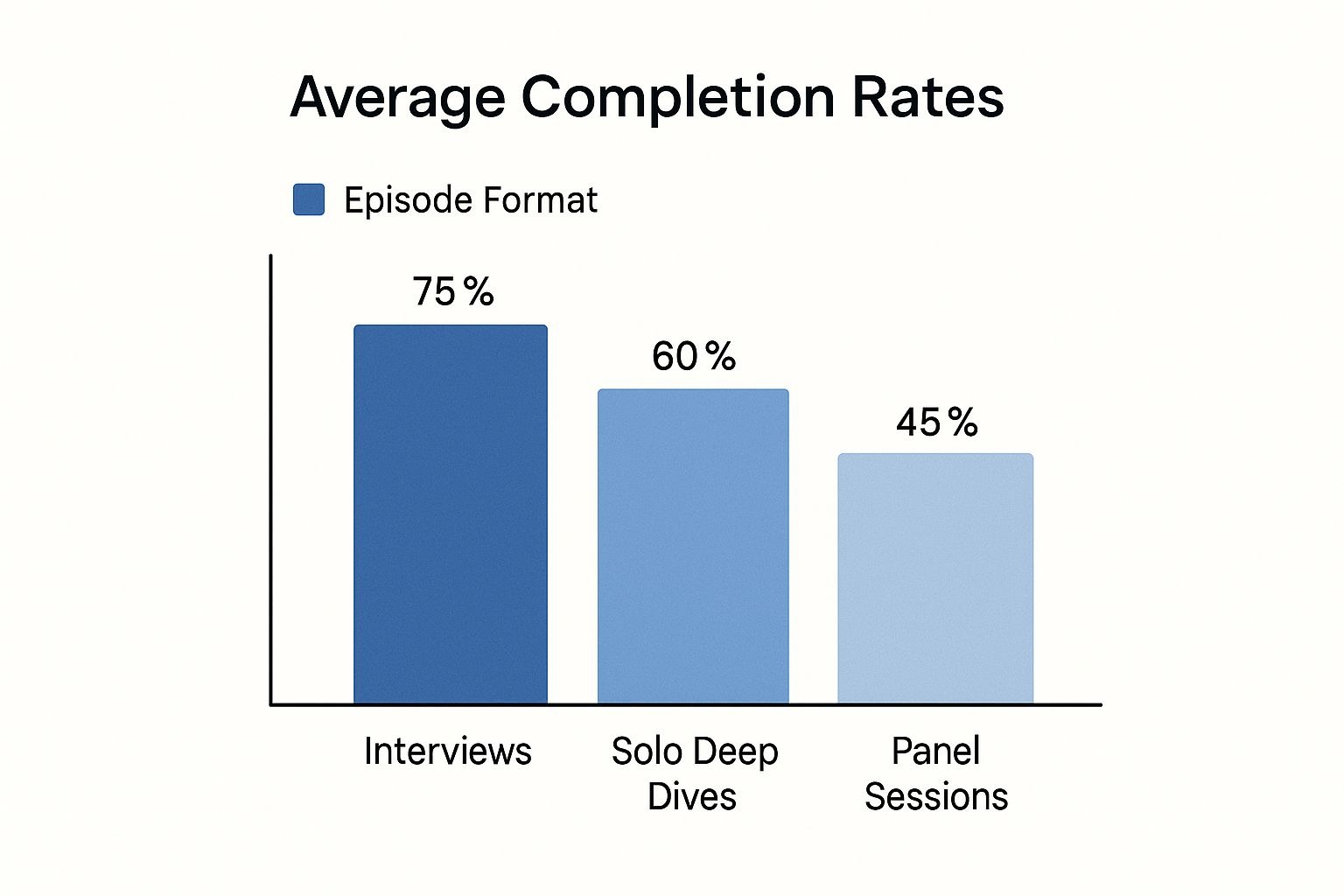
This data shows that having a guest and a natural back-and-forth conversation is incredibly effective at keeping a busy B2B listener engaged from start to finish.
Crafting a Compelling and Authentic Script
Don't let the word "script" fool you. Even the most off-the-cuff, conversational podcasts have some kind of structure behind them. A good script isn't about reading lines; it's a roadmap that keeps the episode coherent, valuable, and on track. For guidance on this, you can learn how to write a script for a podcast that engages.
A script provides structure, not confinement. Its purpose is to guide the conversation toward its intended goal, ensuring every minute delivers value to the listener while allowing for spontaneous, authentic moments to shine through.
Your script should map out the key talking points, how you'll move between segments, and any specific numbers or examples you need to hit. This little bit of prep work frees you up to relax and focus on your delivery, which makes you sound way more natural and confident. For a full breakdown of this process, check out our guide on effective podcast content marketing.
Conducting Interviews That Uncover Unique Insights
When you’re interviewing someone, you’re not just a host; you're the facilitator of a great conversation. The best B2B podcast interviews feel less like a rigid Q&A and more like two experts just riffing on a topic they’re passionate about. Understanding how to conduct a podcast interview effectively is a key skill.
To make your interviews pop, focus on three things:
- Do Your Homework: Seriously. Dig into your guest's background, what they've written, and what they've been talking about recently. This lets you ask sharp, specific questions that show you've done the work and helps you avoid the same old questions they always get asked.
- Ask Open-Ended Questions: Ditch the simple yes/no questions. Instead, use prompts like, "Walk me through the time you..." or "What was your thinking behind the decision to..." These kinds of questions get people telling stories, which is always more interesting.
- Listen Actively: This is the secret weapon. The best follow-up questions almost always come from something your guest just said. Pay attention. Be curious. Be willing to go off-script to dig deeper into an interesting point instead of just plowing ahead to your next prepared question.
Nail these elements, and your podcast becomes more than just content. It becomes a strategic asset for your b2b demand gen engine, with every episode building trust and showing your audience why you're the one they should turn to when they're ready to buy.
Don't Just Record a Podcast, Give It Wings with Social Media and Newsletters
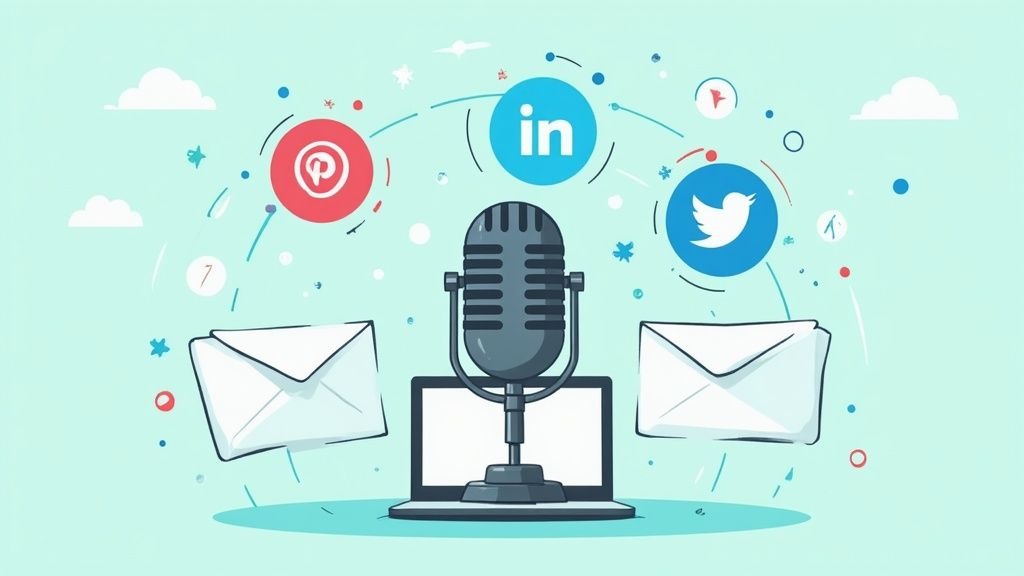
So you've created a brilliant B2B podcast. That's the first step. But here’s the tough truth: nobody is going to stumble upon your show by accident, no matter how good it is. This is where a smart, multi-channel promotion strategy comes in, turning your podcast from a lonely island of content into the sun at the center of your b2b demand gen solar system.
Think of your podcast as a content goldmine. Instead of treating each episode as a one-and-done event, see it as the raw ore for a dozen smaller, more shareable marketing assets. This integrated approach ensures your message reaches people where they already hang out. Social media and email newsletters are the perfect channels to feed people down the funnel to your podcast, where deep loyalty is formed.
Without a real promotion plan, even the world's best podcast will just echo into the void. Smart amplification is what turns your audio investment into actual business results, driving awareness, engagement, and, ultimately, a pipeline of high-quality leads.
Turn Each Episode Into a Social Media Goldmine
Social platforms, especially LinkedIn for the B2B crowd, are the perfect discovery engine for your podcast. A dedicated B2B Social Media Agency can systematically slice and dice each full-length episode into a variety of compelling, bite-sized assets built to stop the scroll and spark some serious curiosity. Repurposing is the secret to maximizing your reach.
This method gives you a never-ending stream of high-value content, keeping your brand top-of-mind. To really make a splash, you'll want to explore more advanced strategies for viral podcast video marketing.
Here are a few proven tactics that just work:
- Short Video Clips: Pull out the most insightful, controversial, or "aha!" moments from an episode, usually 30-60 seconds long. These clips are perfect for grabbing attention in a busy LinkedIn feed.
- Audiograms: These combine a slick image with an audio snippet and an animated waveform. They're visually engaging and give people a taste of the episode’s vibe and content.
- Quote Graphics: Design clean, on-brand graphics featuring a knockout quote from your guest. These are incredibly shareable and hammer home your key messages.
- Discussion Prompts: Don't just post, provoke. Ask a thought-provoking question related to the episode's topic to get comments and conversations started.
Build a Loyal Following with Your Email Newsletter
If social media is for discovery, your email newsletter is for building relationships. This is your direct line to your biggest fans, the people who have already raised their hand and said, "Yes, I want to hear from you." A well-executed newsletter strategy, often managed by a B2B Email Newsletter Agency, turns casual listeners into a true community.
Your newsletter needs to do more than just announce a new episode. Use it to share exclusive behind-the-scenes stories, offer up key takeaways from the latest show, and tease what’s coming next. This makes your subscribers feel like valued insiders, ensuring they never miss an episode.
This focus on a tailored experience is huge right now. B2B demand generation has shifted dramatically, and an overwhelming 98% of B2B professionals now say intent data is critical for knowing which accounts are actually ready to buy.
Weaving It All Into an Integrated Promotion Ecosystem
The best b2b demand gen strategies don't just use different channels; they make them work together. You want to create a flywheel where each channel feeds the others, with your podcast sitting right at the core.
Here's a simple way to look at how these channels complement each other:
Podcast Promotion Channel Effectiveness
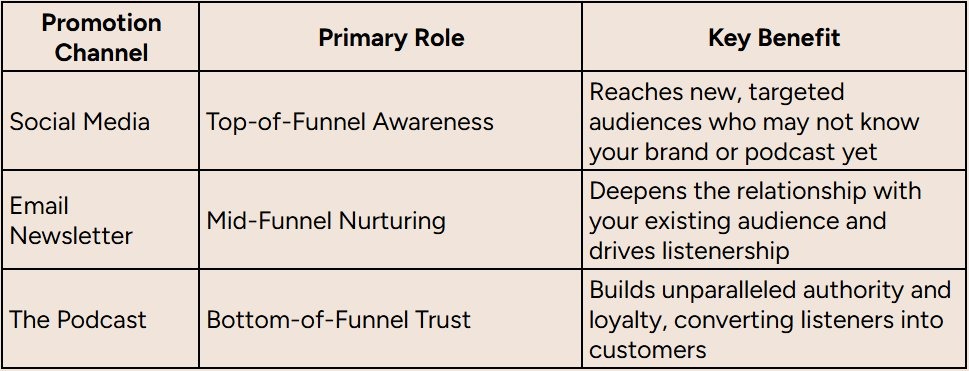
This integrated system works because it meets buyers exactly where they are. Someone might first see your brand via a short video clip on LinkedIn. Intrigued, they subscribe to your newsletter. Over time, they become a dedicated podcast listener, building the kind of deep trust that makes them choose you when it's time to buy. This is the essence of modern B2B podcast promotion.
Measuring the True Business Impact of Your Podcast
How do you measure the ROI of trust?
It sounds like a trick question, but for any B2B demand gen strategy built around a podcast, it’s the only question that matters. Download numbers are a nice starting point, but let's be honest, they’re mostly vanity metrics. The real signs of success are found when you connect your podcast's performance to actual business results.
To do this, you have to look past the basic stats and zero in on the KPIs that show you’re building a genuine connection and influencing your audience. These are the metrics that tell you if you're building a loyal community or just shouting into the void.
Moving Beyond Download Counts
Your first job is to track meaningful audience growth and engagement. This gives you a much clearer picture of your podcast's health and how it's shaping your brand's authority in the market.
Here are a few key metrics to keep an eye on:
- Listener Completion Rates: This one is huge. Are people dropping off after 25% of an episode, or are they sticking around for 90%? High completion rates are a powerful signal that your content is hitting the mark and delivering real value.
- Qualitative Feedback: Don't just look at numbers. Actively hunt for comments, emails, and social media mentions from your listeners. This kind of direct feedback is a goldmine for understanding what’s working and proves you’re building a real relationship.
- Audience Growth Rate: Instead of just obsessing over total downloads, track the month-over-month percentage increase in your listenership. Consistent growth shows your show has momentum and is organically attracting new fans.
Connecting Podcast KPIs to Business Outcomes
This is where the rubber really meets the road. A great B2B podcast doesn't just entertain or inform; it creates tangible business opportunities. Your measurement framework has to tie listening behavior to bottom-line results, proving your show is a strategic asset, not just a creative project.
The ultimate goal of a B2B podcast isn't to win audio awards; it's to become an indispensable resource for your ideal customers, making you the first and only choice when a buying need arises.
Look for these critical signs that your podcast is actually influencing your pipeline:
- Increased 'Dark Social' Mentions: Pay close attention to how often your brand or podcast gets mentioned in private communities like Slack groups or on LinkedIn. This is a powerful, unfiltered indicator of authentic word-of-mouth marketing.
- "How did you hear about us?" Field: This is a simple but effective one. Add your podcast as an option in your demo request forms and track how many prospects point to it as their source. This gives you direct attribution.
- Shorter Sales Cycles: See if prospects who are known listeners move through your sales process faster. An educated, trusting prospect who already feels like they know you is almost always easier to close.
By focusing on these impact-driven metrics, you can confidently show the true value of your podcast. To really get into the weeds on this, check out our complete guide on measuring B2B podcast ROI and pipeline.
Got Questions? We've Got Answers.
Jumping into the world of B2B podcasting is a big step, and it's smart to have questions about how it all fits together, especially when it comes to turning listeners into leads for your business. Let's tackle some of the most common questions we hear.
What are the benefits of investing in B2B podcast promotion?
Think of it this way: without promotion, your podcast is a billboard in the desert. With promotion, it’s a billboard in Times Square.
The primary benefit of investing in B2B podcast promotion is transforming a passive content asset into an active b2b demand gen machine. Promotion is how you get your show in front of new, ideal customers, accelerate audience growth, and cement your status as the go-to expert in your space. Effective promotion ensures every episode hits its full potential, maximizing your return on effort and building an engaged community that actually wants to hear from you.
What are effective B2B podcast promotion strategies?
There's no single silver bullet. The most effective B2B podcast promotion strategies are multi-channel and integrated.
Here are the heavy hitters:
- Content Repurposing: Don't just publish an episode. Chop it up into bite-sized video clips, audiograms, and pull-quote graphics that are perfect for sharing on platforms like LinkedIn.
- Guest & Partner Collaboration: Your guests have their own audience. Work with them to cross-promote the episode to their network. This is one of the easiest ways to tap into a brand new, highly relevant group of listeners.
- Email Newsletter Marketing: Your email subscribers are your most dedicated fans. Nurture this relationship by sending them exclusive content and a note when a new episode drops.
- Guest Podcasting: The best way to promote your podcast is to be a guest on other relevant shows. It’s a fantastic way to build relationships and introduce your brand to an entirely new audience that’s already primed to listen.
How can podcast marketing services boost our company's visibility?
Podcast marketing services boost a company's visibility through expertise, consistency, and scale. Professional services, like what we do here at Fame, bring a specialized team and proven systems to the table. They handle the nitty-gritty of content repurposing, social media distribution, guest outreach, and performance tracking.
This frees up your team to focus on creating incredible content. Meanwhile, the experts are systematically making your brand louder and more visible across all the right channels, ensuring your message reaches a wider, more targeted audience than you could on your own.
What packages do B2B podcast promotion services typically offer?
B2B podcast promotion services typically offer tiered packages based on the level of support and the number of deliverables. Common offerings include a foundational package for startups that covers basic production and promotion, a growth package with more extensive content repurposing and social media management, and a comprehensive enterprise package that includes strategic consulting, guest booking, and advanced analytics. Services can range from simple editing and show notes to full-scale production and multi-channel marketing campaigns.
Are there comprehensive podcast marketing services for B2B startups?
Absolutely. In fact, for a startup, a podcast can be a secret weapon. Many agencies are built specifically to help B2B startups get off the ground with podcasting. They understand the challenge of building a brand from scratch and offer comprehensive services covering everything from initial strategy and equipment setup to professional production and targeted promotion. This allows a startup to launch a show that looks and sounds established, quickly building the authority and trust needed for early-stage b2b demand gen.
Ready to turn your company's expertise into a trust-building engine? Fame is a specialized B2B podcast agency that helps you build authority and drive a qualified pipeline. Launch your B2B podcast with us.

